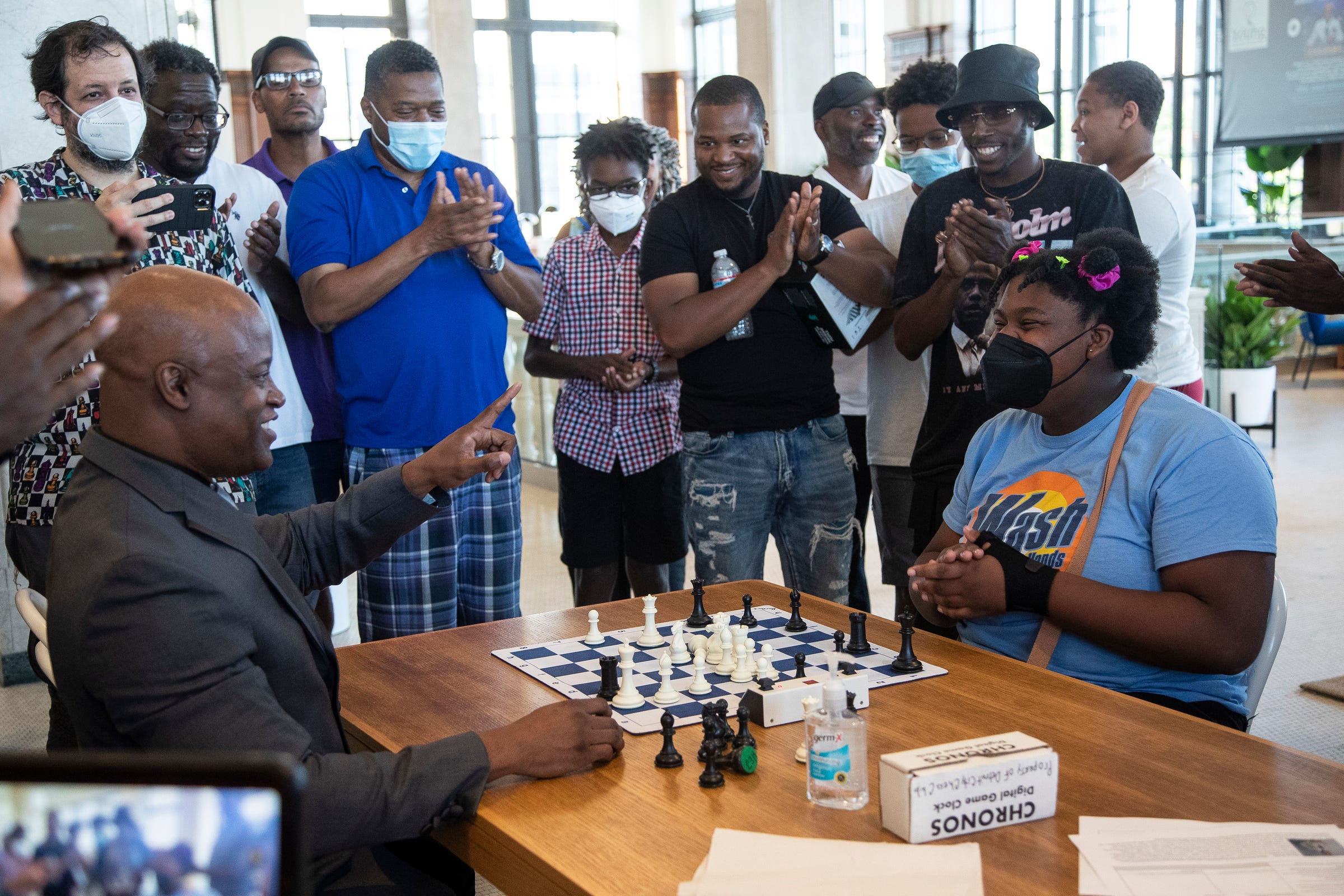Tech Is At The Heart Of The Biggest Chess Drama In Years
The world of chess is currently embroiled in a particularly sinister and gripping drama, the Don't Worry Darling scandal. A dispute between a world champion and a new challenger over cheating at the game's highest level has fueled speculation about the existential threat to chess posed by an artificial intelligence engine small enough to be transported or inside the game. body to be hidden.
The idea, unsupported by any evidence, that a player could enter the unbreakable chess engine even if playing behind the board has been debated for years. However, recent events have got people seriously thinking about this possibility and what it might mean for the future of the game.
The saga began two weeks ago when reigning world chess champion and one of the strongest chess players in history, Magnus Carlsen (pictured above), faced the master of 19 year old Hans Niemann for the Sinquefield Cup. to be honest. dangerous in a surprisingly short period of time.
Carlsen played with white and therefore came first, an advantage he used with particular skill, as for many years he did not lose a game with white and rarely won a draw. However, he not only lost the match soon after (which you can watch here), but also pulled out of the tournament and tweeted what many thought was a thinly veiled accusation of Niemann cheating. Despite calls from officials, fans, colleagues and even former world champion Garry Kasparov to speak, he did not detail his actions. (After this article was published, Carlsen told an interviewer that he would make the announcement after the current Julius Baer tournament, in which the two are playing.)
Niemann, for his part, understandably and emphatically denied any tricks, saying Karlsen's seemingly miraculous preparation for the unorthodox attack came after seeing him in a game years ago. The tournament organizer said there were no signs of suspicious behavior or illegality. Others examined the tape and found no evidence of tampering.
This event and the events that followed (given here only in general terms) sharply divided the chess world, so that even the conservative "wait and see" approach implicitly supports the idea of Niemann's cheating, there therefore has very few neutral positions. be taken away from you. FIDE, the official international chess body, is expected to issue a statement soon that may shed light on the situation, but will not change what has already happened (Update: here).
(Update Sept. 26: Carlsen released a statement confirming suspicions of fraud but refraining from direct accusations or statements of fact.)
colorful story

Promotional images of the last match between Carlsen (left) and Niemann (right). Image credits : Meltwater Chess Tournament of Champions
To be clear, there's no doubt that Niemann is a very high level player - he's played hundreds of games against very strong players in almost impossible to cheat situations, and won by a huge margin.
Other masters noted that Carlsen played badly (for him), while Niemann was just lucky in the preparation, he played well and probably scared the champion, which led to an advantageous position. But Carlsen is not easily disappointed, and he will get sidetracked by slipping up, and besides, he's not one to level baseless accusations against his opponent. They've dated before - they were even surprised a few weeks ago by a fan playing barefoot at a friendly game in Miami Beach.
But Nieman has a past like everyone else. It emerged that Carlsen knew Nieman had previously been caught cheating online - at least twice on Chess.com when he was 12 and 16, the latter of which would have resulted in a six-game ban for prizes. month. He admitted this in an interview, calling it the madness of an ambitious young player - despite still being young and ambitious - and it involves asking someone else in the room to provide moves for him. of chess machine. .
I was just a child. I've never cheated at a board game in my life. I wanted to be ranked so I could compete against better players, so I cheated random games on chess.com. I confronted and confessed. It was the biggest mistake of my life and I'm really ashamed of it.
Although there are countermeasures on the Internet, they are not very reliable. Chess.com hinted that there was something different about Niemann's behavior, but details were not disclosed.
Of course, this kind of behavior is unbecoming of a master, but whatever you say about his character, the fact is that cheating on the Internet is relatively easy, but cheating on an airplane is practically mission impossible. Cheating against a world champion in a major tournament - at a disadvantage? The idea itself is ridiculous.
Where?
The chess community as a whole, a diverse group of players and commentators of all ages and skill levels, couldn't help but wonder what would happen if someone was mad enough to try to cheat the game of Magnus white tray. are you just doing it in theory, for argument's sake, devil's advocate and all that?
It turns out that it's not as absurd as it sounds, and the evidence (although very circumstantial) is enough to admit a shadow of a doubt.
How Technology Came In

DeepMind's MuZero is an example of a general-purpose gaming neural network powerful enough to dominate human players. Image credits : DeepMind
The funny thing about cheating in high level chess is that the first thing a player needs is help.
What advice will he ask for in a match between grandmasters? They can't get like-minded people to wink at them from the galleries: almost everyone in the world plays worse. Chess is more popular than ever, but there are still dozens of people playing at the level of Carlsen and Niemann. The plot is amazing.
However, the chess engine plays at a higher level. He can hear this sentence and Deep Blue and Kasparov, man vs. you might think of a supercomputer, but infinitely better engines than Deep Blue are in every smartphone these days. It can indeed run on a small computer like the Raspberry Pi Zero. Something that will fit in your pocket, your shoe, or maybe somewhere no one would think of.
Players are of course subject to strict security measures, and here you can see Niemann himself on the hunt. This possibility is taken seriously, but technological advances still outpace countermeasures.
The difficulty of such a theoretical tool is twofold.
First, how does he know the state of the game? After all, they are playing with real pieces on a real board. You can ditch the idea of wiggling your fingers or touching your feet to select actions - it becomes very convenient (and easily visible) very quickly. But it turns out that most OTB games at this level are streamed online and recorded in real time - the virtual board is updated immediately after a player places their piece, and others chat, play, etc The move is registered online. . It would be pointless to take this information from the network and transfer it to a wireless device.
It turns out that, according to at least one analysis, Niemann did better in OTB games that were live-streamed this way, and worse in those that weren't (some dispute the analysis or give other reasons for this). And in the match with Carlsen, immediately after the defeat, the broadcast was scheduled with a delay of 15 minutes, which eliminates the possibility of cheating in this way. Strange, but far from convincing - barely a recommendation for anyone not already skeptical.
The second challenge is how the device will provide its suggestions to the player. With the engine offering different lines, you are unlikely to be able to see the screen, but you don't need to. Chess is scored efficiently: Qh5, for example, means the queen is in white's rightmost column, fifth row up. People have pointed out that a few short signals in Morse code or something like that can convey complete information.
Let's face it, that sounds a bit far-fetched – imagine a grandmaster trying to look like he's focused on the game while the engine in his trunk performs promising defensive work. Actually tried and found. But the truth is, it's much simpler: as the game's champions have been saying for decades, any gamer good enough doesn't need to be told what game to play, just have the game to play . to play.
"All I need to be practically invincible"
When reviewing their matches, even the best players note times when they might follow a certain line of attack or defense, crush the opponent, or snap out of the jaws of inevitable defeat. It's the chess version of the "climbing spirit" when you think of a perfect return to a taunt a few hours later as you climb the stairs to bed.
If a grandmaster-level player could count on this move being potentially game-breaking at least once per game, he'd be pretty much unbeatable. No hash code needed - simple signals are enough to tell the player what to play based on their ability to find it.
Carlsen himself expressed this in a 2021 interview (translated from Norwegian):
There are those who cheat in the most obvious and stupid ways. The problem was that he [the 2016 player] wasn't good enough to understand what that meant.
If I start cheating in a smart way, I'm sure no one will notice. I'll just cheat a game or twice and not move, just answer which move would be best. Or there is a chance to win, and here you need to be more careful. That's all I need to be almost invincible, which scares me.
After all, the game doesn't work if you don't trust your opponents. I'm not going to sit here and spread rumors, but it wouldn't surprise me at all if there were so many cheaters in big tournaments, whether they were won or caught.
And here's another quirk of Niemann: sometimes he doesn't explain his failures well. Post-game analysis is a big part of chess commentary, and players often discuss positions, moves, and alternatives. In conversations with other players of his level, Niemann sometimes fails to explain (to those who need to know) the reason for this action, what it leads to or where it will lead.
It's not that strange. Chess is both analytical and intuitive, but flashes of insight may not be so well remembered throughout the brain, especially given the neurodivergent nature of the game. Not everyone has the clinical and holistic perspective expected of the mind - as chess develops, it takes on new approaches and personalities. Niemann is one of those people, outspoken and confident, streaming, tweeting and generally striking up a conversation like any talented 19-year-old would with their beloved community. The way you talk about chess shouldn't be what you expect.
But this occasional failure to explain his thought process in the context of the final drama has been blamed on him by his detractors.
Chess will survive technology (again)
There are two other obvious alternate explanations for all of this: First, Niemann just wrongly beat Carlsen, and it's all a big misunderstanding (although it might damage Carlsen's reputation in some way). Second - again, there's no evidence - someone leaked Carlsen's strategy to an adversary, a more prosaic form of cheating that doesn't require any technology.
If so, the Hans-Magnus fight still hasn't let the (returning) genie out of the bottle. High-tech cheating has been a problem for years, mainly because chess engines have surpassed the level of human play. Commentators have even considered it in some high profile games, but there are still few valid accusations. Metal detectors, prohibition of any equipment in the courts, delay of the broadcast of the match, etc. to avoid the obvious methods. security measures have been taken. However, the possibility exists.
It only takes a few minutes to figure out how to do this with today's technology to come up with something that's technically possible and subtle enough that no one ever suspects anything strange is going on. As Carlsen says, if a smart trickster was good enough to compete for the top spot, he'd be unbeatable. It won't show up in statistical analysis, and it won't fool the intuition of strong players who are fully equipped to detect computer-like failures. (Apparently the style of the AI is unique, dominating in chess and other games.)
As of this writing, Carlsen and Niemann have met again in a live match; Carlsen stunned the chess world by losing after two moves and was quickly criticized by his peers. They say it's one thing to doubt, but participating in such a match and losing on purpose is unfair and unnecessary and jeopardizes his status as a world champion. But others saw it as the act of a man who couldn't say what he knew, and who would rather lose in disgrace than play with a bad conscience. (There is speculation that he has taken his case to FIDE and is awaiting its decision, and he is prohibited from discussing it publicly. Indeed, neither has tweeted for weeks.)
Perhaps it's a crisis of faith in the chess world - the ever present but rarely mentioned specter of cheating suddenly appears in every headline. Such a calculation could lead to as big a change in the world of chess as chess engines did twenty years ago. Failures will remain, of course - but just as players need to understand that they will never be as good as the engine, they may need to accept that subtle GM-level cheating is possible at best and systematic at worst.
How will this change the game and society? Many believed that after Kasparov lost to Deep Blue, humanity would lose its taste for the unwinnable game. In fact, the opposite happened and the chess scene became even more dynamic, the level of play higher than ever. Could the same be true of the idea that AI could be hidden in an opponent's shoe, tooth or watch? It seems strange until you find out that one of them has been gone for years.
The drama is still in development and may actually be less extensive than that. But society cannot forget and must take into account the possibilities it thinks about, at least theoretically. Failures will survive and thrive, but they will never be the same again.



0 Comments:
Post a Comment
Subscribe to Post Comments [Atom]
<< Home